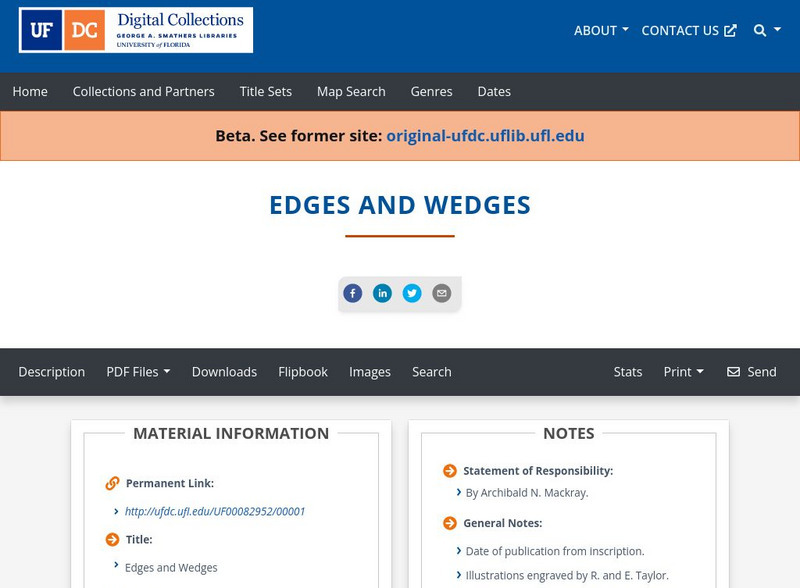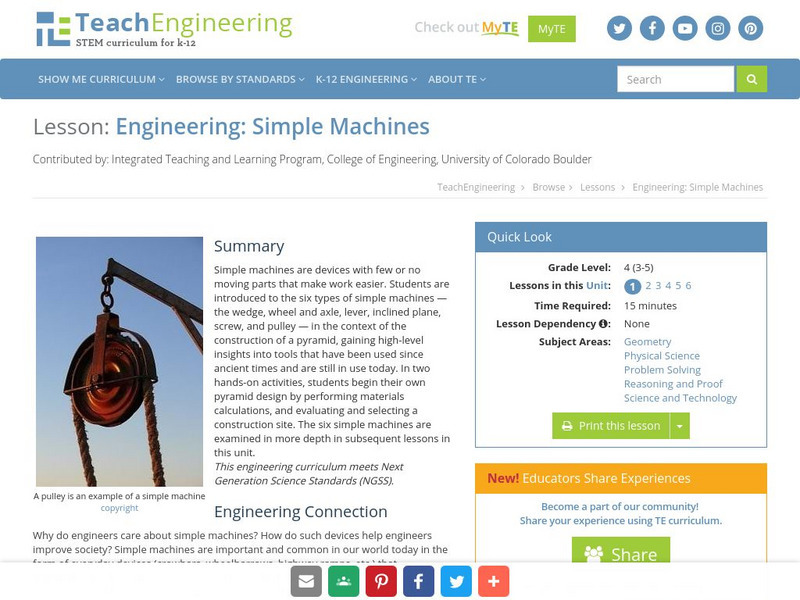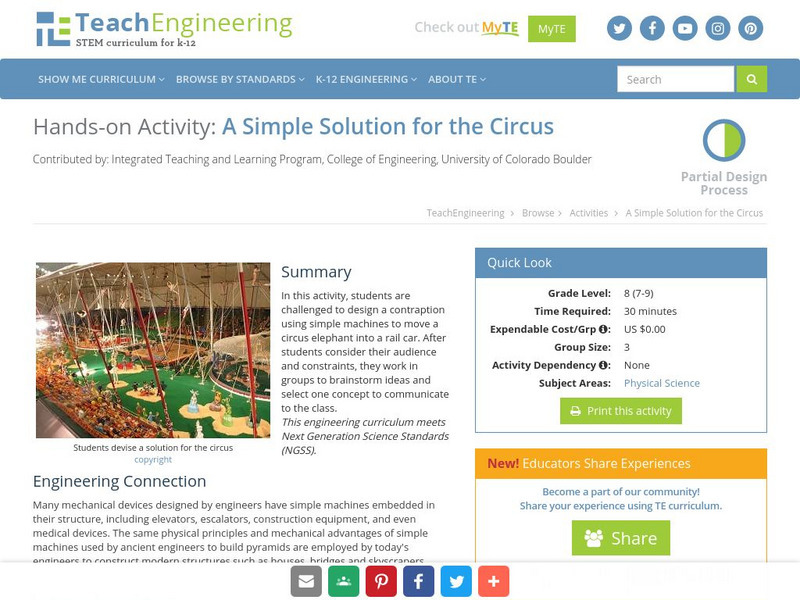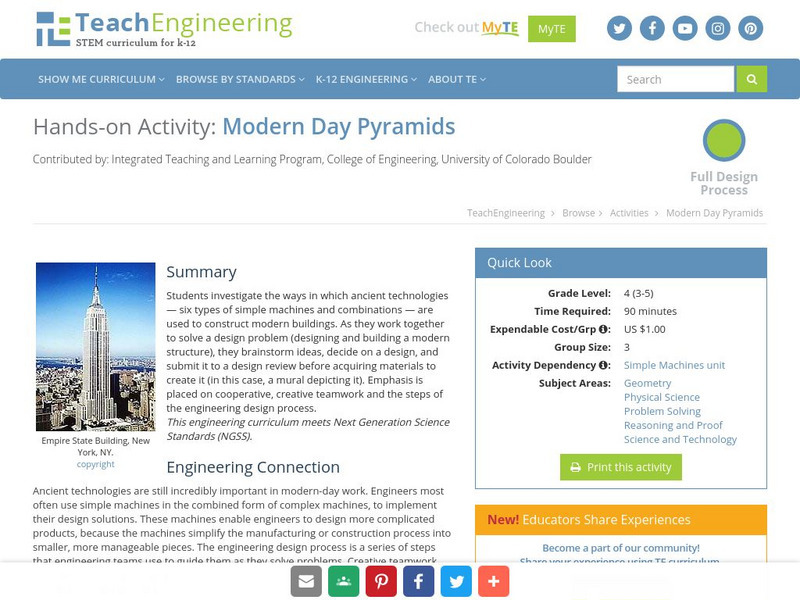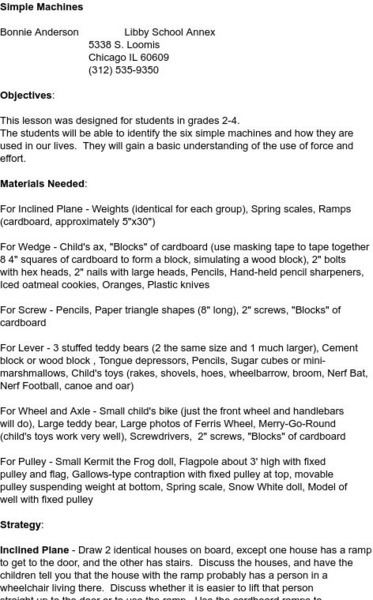TeachEngineering
Teach Engineering: Slide Right on by Using an Inclined Plane
Students explore building a pyramid, learning about the simple machine called an inclined plane. They also learn about another simple machine, the screw, and how it is used as a lifting or fastening device. During a hands-on activity,...
University of Florida
Baldwin Library: Edges and Wedges
A scanned copy of the 1895 publication of Edges and Wedges by Archibald N. Mackray, a fiction book for children.
TeachEngineering
Teach Engineering: Watch It Slide!
Students use inclined planes as they recreate the difficult task of raising a monolith of rock to build a pyramid. They compare the push and pull of different-sized blocks up an inclined plane, determine the angle of inclination, and...
Science Buddies
Science Buddies: Slinking Slinkies
Want to do a project with a toy your parents, or even grandparents, might have played with? Slinkies are fun toys that also make great science fair projects. In this experiment you can build an inclined plane to compare the walking speed...
TeachEngineering
Teach Engineering: Heave Ho!
Students will discover the scientific basis for the use of inclined planes. They will explore, using a spring scale, a bag of rocks and an inclined plane, how dragging objects up a slope is easier than lifting them straight up into the...
TeachEngineering
Teach Engineering: Engineering: Simple Machines
Simple machines are devices with few or no moving parts that make work easier. Students are introduced to the six types of simple machines - the wedge, wheel and axle, lever, inclined plane, screw, and pulley - in the context of the...
TeachEngineering
Teach Engineering: Solid Rock to Building Block
Students continue their pyramid building journey, acting as engineers to determine the appropriate wedge tool to best extract rock from a quarry and cut into pyramid blocks. Using sample materials (wax, soap, clay, foam) representing...
University of California
University of California at Berkeley: Understanding Science: Mystery Boxes
An interesting lesson where students collaborate to create a visual image of what the inside of a sealed box looks like. The box has a marble or other type of sphere inside it, as well as partitions and/or ramps. Students come to...
TeachEngineering
Teach Engineering: A Simple Solution for the Circus
In this activity, students are challenged to design a contraption using simple machines to move a circus elephant into a rail car. After students consider their audience and constraints, they work in groups to brainstorm ideas and select...
TeachEngineering
Teach Engineering: Modern Day Pyramids
Students investigate the ways in which ancient technologies - six types of simple machines and combinations - are used to construct modern buildings. As they work together to solve a design problem (designing and building a modern...
Science and Mathematics Initiative for Learning Enhancement (SMILE)
Smile: Simple Machines
Good combination of teacher demonstration and student interaction for this simple machine lesson. Great for talking about force and work. Plans are for grades 2-4, yet are adaptable.
Alabama Learning Exchange
Alex: How to Make Something Simple, Hard
Learners will have completed a unit of forces and motion prior to the current unit of study on simple machines (lever, inclined plane, screw, wedge, pulley, wheel and axle). Students will review the functions and examples of simple...
Science and Mathematics Initiative for Learning Enhancement (SMILE)
Smile: Potential Energy: How Is It Related to Kinetic Energy
After creating three different ramps with various heights, students will release toy cars from the tops of each ramp. Based on the elementary age level, students will collect data and analyze it.
Science and Mathematics Initiative for Learning Enhancement (SMILE)
Smile: Lab Activity, Rotational Inertia
A lab activity in which students observe the rolling of objects along an inclined plane. The the rotational inertia of the objects are compared based upon their acceleration along the incline. Directions and assessment ideas are given.
PBS
Wgbh: Peep and the Big Wide World: Roll or Slide?
A classroom activity where students discover whether an object rolls, slides, or stays put.

